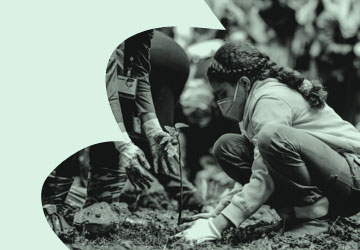EYV 2011: Where are we?
A look at opportunities and challenges of the European Year for Volunteering celebrated by 100 million citizens
di Staff
Joshua Massarenti & Riccardo Bagnato
Every EU Member State has its own definition of volunteering, and its own laws that regulate its activities. Nevertheless, European Volunteering has already become a reality. From Lisbon to Warsaw, from Rome to London, over 100 million European citizens volunteer guaranteeing social cohesion in their countries – a true Army for Peace. So much so that Brussels decided to dedicate the European Year 2011 to volunteering sector (EVY2011).
«The money available for this programme has sadly been very little, but it’s a long road, which must be followed through right to the end», underlines Marian Harkin, Irish Member of the European Parliament (MEP) dedicated to supporting the Non Profit sector in these difficult times, and one of the major promoters of the EVY2011. «In September the Commission will sum up how the project has been going so far, and only then will we know more».
2020 Agenda
According to Vita’s sources from within the EU’s Executive branch, Barroso’s Commission will be presenting a statement which outlines the role the volunteering sector will have in the EU policy agenda 2020. In Brussels, during this pro-Volunteering European year, the buzz word has been “legacy”. For European volunteer associations it is vital that this year ends with the opportunity of getting concrete answers.
What does European Volunteering need? Three key ‘inputs’: the definition of a legal framework valid in all EU countries; standards with which to measure the economic value of volunteering and recognition of the work-time of volunteers in co-financed projects.
European volunteers, together with MEPs like Marian Harkin and the European Economic and Social Committee (EESC), have tried to oblige Brussels to face these three challenges so as to avoid the European Volunteering Year from drowning in endless proclamations, and ending up with nothing but a list of good intentions.
Whilst waiting for the European Commission’s communication, and of course the will of the member states to support volunteering as a whole, we’ve asked a few civil society members to take stock. Nine months on from the launch of the European Volunteering Year, what results have been achieved to date? And which objectives need to be achieved by the end of the year?
Danielle Bernedet from France Bénévolat has no doubt. Member of the Executive of one of the most important centres of solidarity from across the Alps, Bernadet explains it like this: «It’s a fantastic opportunity to improve the visibility of our sector. The convoy stopping off in Europe’s major cities, promoting volunteering culture, also passed through Paris. It was a huge event, which gained national attention. »
Raising Awareness is thus the magic word that sums up the meaning of this Year of European Volunteering, at least in France. But there is more. «In these first few months we have also managed to create a national network of associations that before had difficulties in meeting up.» Bernadet explains. She concludes: «This is one of the most important results we take away with us into 2012. » So, all is well? «One critical point remains, communication. In other words, whilst on the one hand thanks to some events we’ve managed to get first page coverage, in reality the French volunteering sector still finds it very difficult to maintain constant contact with the institutions.»
From this point of view things are no better on the other side of the Rhein, in Germany, where Mirko Schwaerzel, European Project Manager for the German Network of associations Bundesnetzwerfk Bürgerschaftliches Engagement, explains: «It has definitely been a great opportunity, but I have to say it hasn’t changed much. In Germany the sector is already quite structured so the European Year of Volunteering hasn’t really done much other than add an institutional element and some funding, but it hasn’t increased the sector’s capacity. »Kind but severe in his judgement, Schwaerzel adds: «Another problem is that a project like this one, coming from Brussels with its ever present burden of bureaucracy, hasn’t really brought Europe closer to the small local volunteer associations, whose only experience of the event has been through hearsay. »
Who, on the other hand, has a little more to say on the matter is Martijn Pakker, Director of the European Volunteer Centre: «I have been in office as Director of the CEV (European Volunteer Centre) only from last May, but my impression is that this programme has given the sector the opportunity to make itself seen, to get to know itself better and to increase its prestige within the European Institutions. »
And now? «Now we need to wait and see what remains of this year, » the deputy chairman of the CEV and President of the Volunteer Centre of Lazio (Italy), SPES Renzo Razzano, says. «An important milestone would be the adoption by the Commission of some of the points expressed in the European Volunteering Manifesto proposed in 2009. Finding agreement across all member states and their respective legislatures on a common definition of volunteering would also be of great importance so that we can final make more homogenous cross-country comparisons. »
This article is an extract from Vita’s special report on European Volunteering. Download the whole report above.

